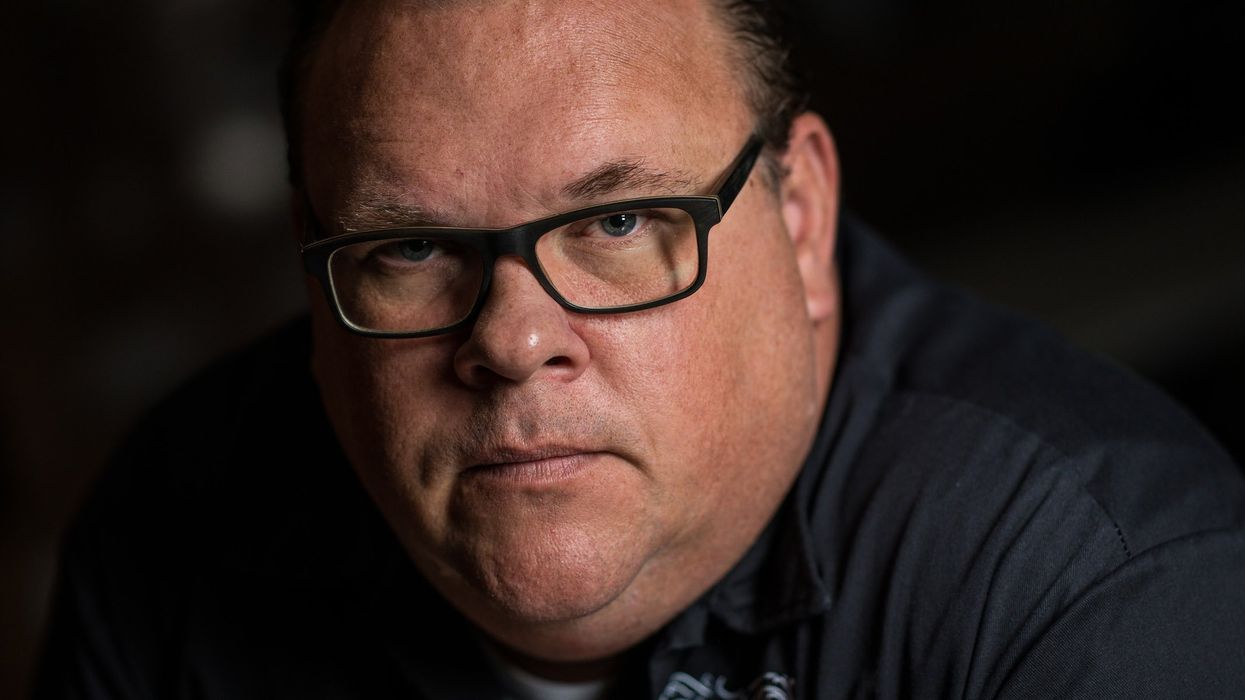Q: What’s Next for Star Chef Chris Shepherd After Underbelly? A: ‘I Want to Figure Out My Life Now’

FOR A DECADE, Chris Shepherd, now 50, has been the most celebrated star of Houston’s famously emergent culinary scene.
His mission to “tell stories through my food, stories that represent and reflect where we live,” as he wrote in his 2019 cookbook, was inspiring and timely. It helped set the stage for a city long thought of unfairly as a backwater, where you could get good fajitas and a steak but not much in the way of sophisticated dining, to claw its way to prominence.
And it helped Shepherd, Houston’s second-ever James Beard Award winner, to grow his own empire. His Underbelly, which moved and evolved into UB Preserve, earned national praise as it highlighted flavors and techniques reflecting H-Town’s multiculturalism. As his prestige grew — he made his spicy Korean Braised Goat Dumplings on Jimmy Kimmel Live! — his Underbelly Hospitality, a partnership with MLB Capital Partners, boomed. His shifting-concept One Fifth carved from an old Montrose church, and Georgia James, a steakhouse named after his parents, were just a couple of the concepts that captured the city’s fascination.
Then, last summer, a shocker. “Chris Shepherd is departing Underbelly Hospitality,” read the press release, disseminated by his wife, hard-working power publicist Lindsey Brown. The master chef would no longer be associated with his popular eateries. Why? Officially, Shepherd was ready to downsize, to focus on “smaller projects” and his Southern Smoke nonprofit.
The latter has certainly borne out. After a two-year Covid hiatus, the foundation, founded to support hospitality industry workers in times of crisis and those with mental-health needs, produced its biggest extravaganza yet in the fall. With dozens of chefs, and thousands of attendees experiencing days of food-fest fun, Southern Smoke, which has recently grown to 13 full-time employees hoping to eventually expand the effort to all 50 states, raised $1.62 million.
CityBook visited with Shepherd at his newly renovated Montrose spread, near an eat-around kitchen island larger than some swimming pools. He’s been keeping busy by, among other things, picking peppers from a nearby community garden and making preserves — and making plans for what’s next.
One of the first folks you ever helped through Southern Smoke, a young man named Danny, the owner of a pizza joint in the Houston suburbs who’d been in a devastating motorcycle accident, turned up at the event this year. He stood up from his wheelchair and made a pizza. Special moment? When we walked in the hospital in 2018 and saw him and met his mom and family for the first time, and understood that insurance has said they were done and that this kid had a day or two to figure out what’s going to happen … There wasn’t really an option. It was, put him in a hospice and watch him die. To tell a parent that, I just couldn’t imagine.
When we were able to fund the $100,000 for Danny to get into [Memorial Hermann’s renowned TIRR rehabilitation center], we sent an email to all the chefs to let them know, “This is why you were here. This is why you did what you did.” To watch him stand up … full-on tears. It was so hard just to watch; it was such an emotional moment.
You’re filling a gap people may not know much about. Folks in your industry often don’t have adequate insurance, right? Or none. Just think about a restaurant you go to all the time. Your favorite neighborhood joint, and the same person that takes care of you every time you’re in, you’re on a first-name basis with them, but you don’t really know their life, right? Then all of a sudden, they’re not there for a few weeks. Well, they were out at the park with their family, and he or she stepped in a hole, broke their leg, or twisted their ankle. They can’t work, and so now they can’t pay bills because it’s a very day-to-day operation in this industry. Then you can’t put food on the table for your kids. You can’t pay your cellphone bill to call someone. It goes down the list, the rabbit hole opens up.
I knew it as a young cook working that day-to-day. Man, I’ll never forget borrowing five bucks to put gas in my tank so I could make it back to work the next day. What would happen to me if something bad happened? I’d be screwed. I had great parents. They’d be like, “All right, here, let’s help this out. Let’s get you at least going in the right direction.” Not everybody has that.
You know how much better our industry is without having the cloudiness of fear and thoughts like that? The dark nights of mental stress. We want to make sure … there’s always somebody there to be like, “Man, I got you. I don’t want anything from you. I just want you to be better, and I got you.”
What we learned through the pandemic is our industry is an eggshell that can be smashed at any time, and somebody needs to be there to glue the pieces together. I look forward to the day when Southern Smoke is not needed, but I only see it getting bigger. It will always have to be there. Because I don’t think there’s going to be a system where the eggshell doesn’t get a little cracked.
Let’s talk about the big news from a few months ago, that you left your restaurants. Why? Was there a conflict with your partners? No, it was just time. The group wanted to grow, and we set it up for that. But that just wasn’t for me. I always said, if I couldn’t go to all the restaurants in a single day, then it would be really hard for me. If you’re going to expand, you gotta go all in. I can only be at so many places at a time, and there were times when I couldn’t go to the restaurants.
On Friday or Saturday nights, I would tell Lindsey, “Alright, so I’m going to go by this restaurant, and then I’m going to go here, and then I’m going to go here, and then I’m going to go here.” But if you’re only spending an hour at every restaurant, does it really count? Does that make sense? I decided I need to have a life — for me.
So you don’t want to build an empire? Lindsey would say, “When’s enough, enough?” You’re right. It’s not what I got into this for. I really got into this to put food on a plate and give it to somebody and see what the reaction was, not to be at a restaurant for dinner service for an hour.
I love being a leader and teaching and mentoring and being that to people. At Underbelly, I knew every single person … everybody’s name, everybody’s story, everybody’s family. Then as you grow, you just start to not do that. You can’t. You can’t keep up with people.
Running restaurants is fun. It’s amazing. But it is a life. I always said to our team, “This is what you do for a living. It’s not your life.” We get to the point where it’s like, I want to do something else. I want to focus on something small and figure out my life now. Not like, okay, I’ll see you at midnight every day. That’s not sustainable for anybody.
But I think of Georgia James. I mean, it’s named after your parents. Isn’t that hard to let go of? You know what? I hate to say it like this: There’s also a porn star named Georgia James. Do not put Georgia James in your search terms or Google.
The name still means something because that’s my mom and my dad, right? No matter what happens with it, if it becomes 27,000 restaurants or two or one, it’s fine. It’s still my mom and my dad, but it doesn’t hold so much of a personal connection. Georgia and James are just words. They can be a porn star. It can be somebody else’s restaurant. Whatever. I had to explain it to my parents that way, too. My mom’s like, “Well, it’s my name.” I’m like, yes, but not really anymore. There are a lot of people named Georgia, and there are a lot of people named James.
So what’s next? You’re doing some wine writing for Culturemap, and I’ve gathered you have an interest in kitchen design, or maybe making bottled sauces for the grocery store. But mainly I want to know, will there be a new restaurant? Should we do this again? Should we get back in the restaurant game? I’m sure as hell I would, but it’d be on my terms. Ten, twelve seats, a small wood-burning thing, a small oven and a couple of burners. That’s what I would want. It’d probably be only three days a week, and it’d be like Tuesday, Wednesday, Thursday. It’d probably close at like 8pm. It’s like, “I want to go home. Bye, guys.”
I don’t know if I’m ready to get back in it yet or not. We’ll see. Then again, I say that today and then tomorrow I’ll be like, “You want to go look at a spot? I got good lease terms.”
It was funny because with Southern Smoke just having happened, and having all these chefs in town, and we’re sitting around talking, everybody’s having a cocktail, they’re shooting the shit, and they’re like, “Man, labor sucks. Cost of goods suck. Rent sucks. This sucks, that sucks. When do you open a restaurant?”
“What? You just told me all the reasons not to.”
But you’re definitely not retiring? No, man, come on. I can’t retire.
At some point, I’m going to have to figure that out and really find something that drives me. I’m good at cooking. I feel that I’m good at cooking, at least. I love cooking for people, and there’s nothing better.
- Shocking Chef News: Chris Shepherd Leaves His Restaurant Company ›
- Southern Smoke Festival Fires Up 2023 Lineup: New Location and Events - Houston CityBook ›
- Have Food, Will Travel: From Austin to NYC, Here Are Fall Food and Wine Festivals Worth the Trek - Houston CityBook ›
- Taqueria Replaces Wild Oats, Pastore Adds Lunch, and other Mouthwatering Underbelly News - Houston CityBook ›
- Iconic Restaurant Space Gets New Tenant — But Not Until 2025. Here's What to Expect - Houston CityBook ›
- Julia Child Traveling Dinner Series Hits Houston for the First Time: Kick-Off February 8 - Houston CityBook ›
- Austin, California and Beyond! Fall Food and Wine Festivals Worth the Trek - Houston CityBook ›
- March of Dime's Signature Chefs Tempts Foodies and Raises Funds for 'Moms and Babies' - Houston CityBook ›










